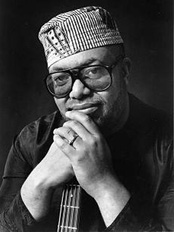
 "God has brought many things out of oppression. He has endowed his creatures with the capacity to create - and from this capacity has flowed the sweet songs of sorrow and joy that have allowed man to cope with his environment and many different situations.
"God has brought many things out of oppression. He has endowed his creatures with the capacity to create - and from this capacity has flowed the sweet songs of sorrow and joy that have allowed man to cope with his environment and many different situations.Jazz speaks for life. The Blues tell the story of life's difficulties, and if you think for a moment, you will realize that they take the hardest realities of life and put them into music, only to come out with some new hope or sense of triumph. This is triumphant music.
Modern Jazz has continued in this tradition, singing the songs of a more complicated urban existence. When life itself offers no order and meaning, the musician creates an order and meaning from the sounds of the earth which flow through his instrument.
It is no wonder that so much of the search for identity among American Negroes was championed by Jazz musicians. Long before the modern essayists and scholars wrote of "racial identity" as a problem for a multi-racial world, musicians were returning to their roots to affirm that which was stirring within their souls.
Much of the power of our Freedom Movement in the United States has come from this music. It has strengthened us with its sweet rhythms when courage began to fail. It has calmed us with its rich harmonies when spirits were down. And now, Jazz is exported to the world. For in the particular struggle of the Negro in America there is something akin to the universal struggle of modern man. Everybody has the Blues. Everybody longs for meaning. Everybody needs to love and be loved. Everybody needs to clap hands and be happy. Everybody longs for faith. In music, especially this broad category called Jazz, there is a stepping stone towards all of these."

Associate Professor of Music "Doctuh" Michael Woods is the Director of Jazz Studies at Hamilton College.
Born in Akron, Ohio in 1952, he grew up listening to Black gospel music and rhythm and blues. Woods studied music formally at Akron University where he finished with a B.M. degree in composition. He went on to obtain two masters degrees from Indiana University. Woods received his doctorate degree in music composition at University of Oklahoma in 1991.
Woods also studied jazz arranging and film scoring at Berklee College of Music in Boston and completed a post-doctoral fellowship in Arts Administration. As a composer, Woods was awarded a grant from the National Endowment for the Arts. He has written over 500 pieces in all styles. His compositions have been performed by the Albany Symphony, the Pittsburgh New Music Ensemble, the Little Rock Symphony, the Tulsa Philharmonic, the Lafayette Symphony (Indiana), the Pro Musica Orchestra (Columbus, Indiana), the Central New York Jazz Orchestra, and the Salt City Jazz Collective.
The Art of the Quintet, Featuring Original Music By Doc Woods
New Profile of Doc Woods
Juneteenth in Utica, New York
"Doctuh" Michael Woods New Grooves for an American Orchestra Concert
"New Grooves for an American Orchestra" Concert Review